

|
Archive
Blog
Cast
Forum
RSS
Books!
Poll Results
About
Search
Fan Art
Podcast
More Stuff
Random
Support on Patreon |
|
New comics Mon-Fri; reruns Sat-Sun
|
1 {photo of a glass of wine with a vineyard behind}
1 Caption: Wine
|
First (1) | Previous (3343) | Next (3345) || Latest Rerun (2580) |
Latest New (5175) First 5 | Previous 5 | Next 5 | Latest 5 Annotations theme: First | Previous | Next | Latest || First 5 | Previous 5 | Next 5 | Latest 5 This strip's permanent URL: http://www.irregularwebcomic.net/3344.html
Annotations off: turn on
Annotations on: turn off
|
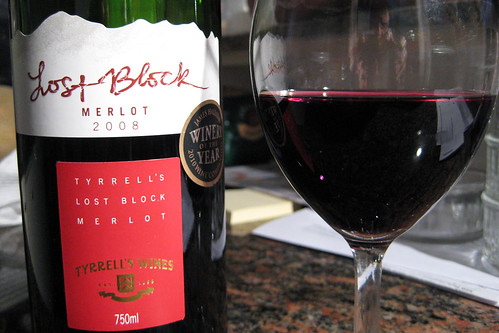 An Australian Merlot. |
Now, Britain is not particularly known for wine, but it does claim several other alcoholic beverages. So in this series they visited breweries and distilleries, and sampled beer, whisky, cider, perry, apple brandy, vodka, gin, and they even managed to find a winery. This is a very broad range of drinks, and their descriptions of the different flavours and aromas made me want to try them all.
I've never been a big drinker. I was virtually teetotal up until about six or seven years ago, breaking it only for the odd glass of champagne at a wedding. But then I discovered wine. I distinctly remember the first two glasses of wine I ever had.
The first was in my early twenties, when I was at university and I went on a ski trip with some of the people I used to hang out with back then. At the ski resort we had a dinner, and for some reason I agreed to a glass of wine that someone had ordered. I tried it tentatively, and found it delicious. I have no idea what it was - at the time I could only identify it as "red wine". I remember it being luscious and somewhat sweet, not what I was expecting at all. (Even now I have no idea what it was. My memory of the taste is too vague. A red dessert wine, or even port perhaps?)
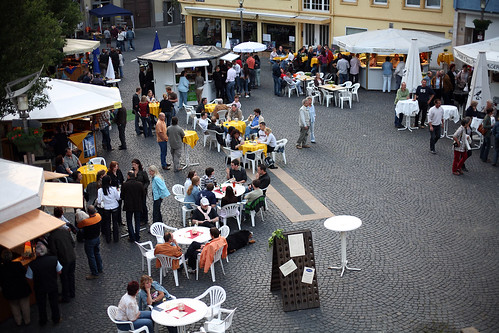 Wine festival in Bingen. |
That experience was enough to put me off trying wine again for many years. I think it was 2007 before I next tried any alcoholic drink other than wedding champagne. That year I took a holiday to Germany with my wife. One can hardly visit Germany without sampling at least some of the drinks there. I tried some beer, and found it surprisingly tasty. Some of the restaurants brought us gratis digestifs after dinner, and I got to try various shots of schnapps and herbal liqueurs such as Jägermeister. These had a wide variety of interesting flavours. (They're also very strong, so it's best to have them in small quantities.) And finally, one evening in the small town of Bingen on the Rhine River, in the heart of grape growing country, we happened to arrive in the middle of a wine festival. Experiencing local events is part of a good vacation, so we bought a couple of glasses to try and found them enjoyable.
Since then I've sampled many types of wine and come to appreciate the dominant flavours of the various grape varieties and styles, as well as the subtle nuances of different instances of each one. Now I understand why so many people like wine and want to experience so many different wines. It's a sensory exploration, in a similar way to exploring different types of music and different composers or bands with your ears. Having not liked wine for so long, I also understand how some people can be put off by initial attempts, in the same way that listening to a scant few pieces of music from an unfamiliar genre (be it a classical, or popular, or avant garde genre) often doesn't convince you to like it. But if you take the time and effort to sample a bit more deeply, suddenly a whole new sensory world opens up in front of you, and you start to want to listen to more of this unfamiliar music, and also to more different types of music.
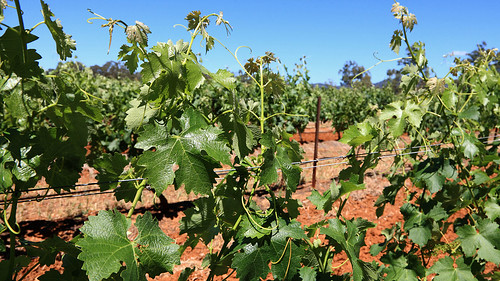 Grape vines. |
Some people like the familiar. I know some people who always order the same dish when they go to certain restaurants, because that's what they like. That's fine, and sometimes I like to order an old favourite too. But more often I like to sample something on the menu that I've never tried before. I get a thrill of discovery and feel like I'm exploring new territory. And that's what I get from wine as well. There are so many different flavours out there that I feel like I'm missing out on experiencing some of the richness that life has to offer. The only solution is to try everything, sample widely, and enjoy the experience.
I began writing this intending to talk about how wine is made and some of the science behind both the making and the tasting of wine, but I kind of got distracted a little there.
Wine is the fermented juice of grapes. You can also make similar drinks out of other fruit, but whether they are "wine" or not is debatable, and I won't discuss them further today. Why grapes? Well, as it turns out, grapes happen to have some very interesting properties, which lead to the vast number of different possible wines you can make with them. Firstly, they can be cultivated into a huge array of different varieties. There are white grapes (which are actually a pale green), and red grapes (which can have a purple tinge or be almost black), and various cultivars of these have different amounts of acidity, sweetness, and the various aromatic compounds which give different grapes their tastes when eaten as fruit. Just as there are hundreds of types of apples, there are hundreds of types of grapes.
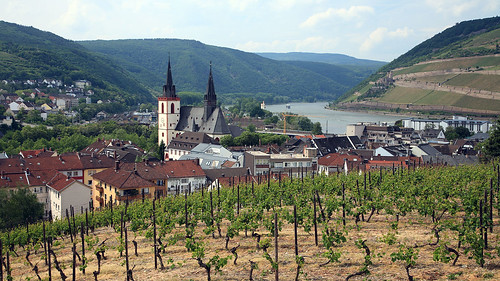 Vineyard overlooking Bingen, on the Rhine River. |
This neutrality of grape flavour doesn't mean there are no flavours at all. On the contrary, it means that the numerous aromatic compounds in grapes which impart flavour are on a roughly even footing, and that given a nudge any of them could come to dominate. Grapes contain compounds which, on their own, resemble the flavours of many other different things: fruits, herbs, flowers, spices, and other things. By tipping this delicate balance one way or another, the resulting wine made from grapes can span an amazing range of different scents and flavours.
Thirdly, grapes are strongly affected by their growing conditions. The overall climate and the day-to-day weather during the growing and ripening seasons affect the growth of the grapes and the balance of compounds within them. It affects their sugar level as well, which is a critical factor in determining how the grape juice ferments. This is the reason that wines made in one region from exactly the same grapes as wines made in another region with a different climate taste different, and the reason why wines made in one year at exactly the same vineyard taste different to wines made the next year. The climate difference doesn't need to be huge, either. Grapes grown on the north side of a hill will be different to the same grapes grown on the south side of the same hill, because of the difference in amount of sunshine they receive. Grapes grown on a hillside will be different to the same grapes grown on flat land adjacent, because of the difference in rainwater drainage.
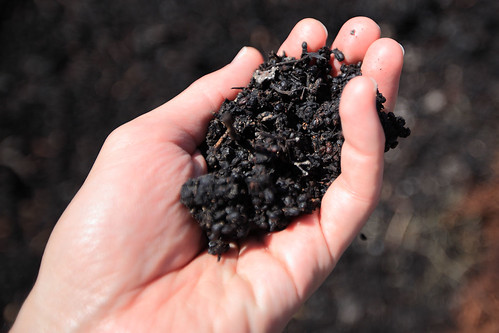 Leftover grape mulch, after the juice has been pressed out. |
After growing the grapes, the next step in wine production is picking the fruit. When the fruit is picked also plays a part in determining the flavours of the wine. Grapes left longer on the vine accumulate more sugars, most of which are converted to alcohol by the fermentation. A matter of a few days can make a noticeable difference in the end result.
Once picked, the grapes are pressed to extract the juice. The juice of grapes is all clear and pale; the colour of red grapes exists only in the skin. You can make white wine from red grapes by being careful not to let the coloured compounds in the skins enter the juice. To make red wine, you have to allow the skins to soak in the juice and release their colour during fermentation, which also releases additional flavours. The most important additional compound released from red grape skins is tannin, the same compound which gives tea its bitter astringency.
After pressing and possibly straining to remove any gross debris such as grape skins, seeds, stems, and other bits of plant material, the juice is fermented. Simply put, yeasts convert the sugars in the juice into alcohol. Yeast can either be added, or the juice can be exposed to the air to pick up naturally occurring yeasts from the environment. Sometimes the grapes will have a natural dusting of yeast spores when picked. The initial fermentation takes up to a couple of weeks. After this period the juice, now raw wine, is filtered more finely. It is at this stage that the skins are removed from red wine. By now all or almost all of the sugar has been converted into alcohol.
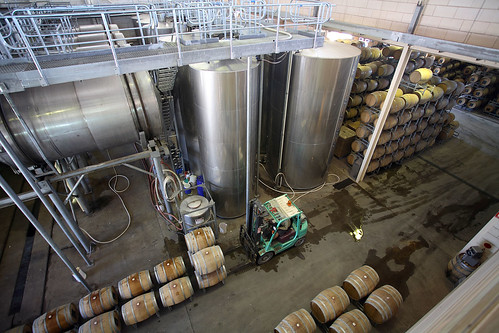 Winery, showing steel fermentation vats and oak ageing barrels. |
After a few months of this, the secondary fermentation is done and the wine can be bottled. Sometimes red wine is left in the barrels for longer to absorb more oak, but eventually it too is bottled. The young wines can be drunk straight away, but often still retain a bit of harshness from acids and, in the case of red wine, tannin. Now comes the curious habit of ageing wines, letting them sit undisturbed for perhaps years or even decades in a cellar. The purpose of this is to allow further chemical reactions to take place, breaking down the acids and tannins and creating more complex profiles of flavourful and aromatic compounds. The ageing wines must be held at a coolish temperature; too high and reactions produce acetic acid, the main component of vinegar, which understandably makes the wine end up tasting like vinegar. Because the temperature is cool, the desired reactions proceed slowly, so it takes a long time for them to do their work.
Not all wines benefit from ageing in this way. Some white wine varieties, particularly those made from grassy or herby grapes such as Sauvignon blanc, are best in their first year or two after bottling and go downhill all the way from there. But more buttery whites such as Semillon and Chardonnay, and red wines high in tannin in particular can benefit from extended ageing. A complex red wine has a distinct "immature" taste when young, a tartness and mouth-drying tannin feel, which softens and mellows as the wine gets older, potentially becoming a rich blend of flavours which persists in the mouth and bestows an almost unbelievable sensory experience.
I am no wine expert, but I have learnt a bit over the past few years, both by reading up on the science of wine and by tasting broadly across many different grape varieties and places of origin. It takes a bit of getting into, and certainly initial tastes of wine can be off-putting if you get something far outside your experience. But I have come to relish trying new things outside my experience. It's been an eye-opening journey, and one which makes me want to try even more new things. There's a lot more that can be said as well, about sweet wines, sparkling wines, the interaction of wine with food, wine-derived spirits such as port and brandy, and so on, but this taste is enough for today.
|
LEGO® is a registered trademark of the LEGO Group of companies,
which does not sponsor, authorise, or endorse this site. This material is presented in accordance with the LEGO® Fair Play Guidelines. |